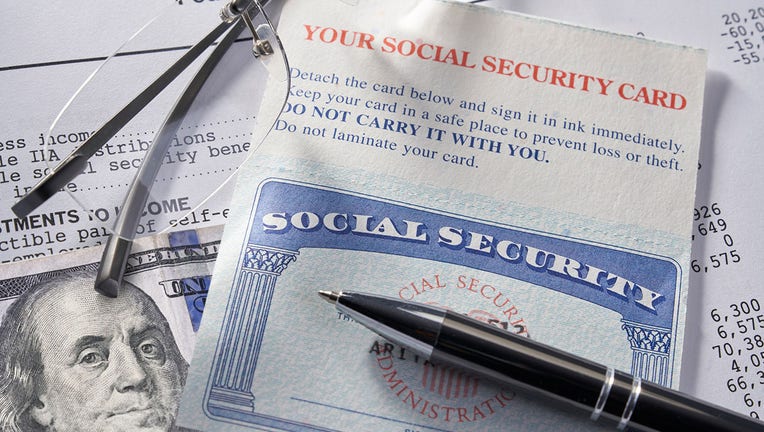Why is Social Security running out of money?

Social Security is running low on funds, here are some of the reasons why. (iStock)
The Social Security trust fund is struggling financially and the agency said it could reach its depletion date in about 12 years, but that does not mean it will completely run out of money.
This is because the Social Security Administration (SSA) pulls in money for the Social Security Trust through the Federal Insurance Contributions Act (FICA) and the Self-Employment Contributions Act (SECA). Since the trust is funded through payroll taxes, it is constantly being paid into and generating new revenue.
But while it will not go broke, the SSA said it could be forced to cut benefits significantly for retirees and other beneficiaries if Congress doesn’t find a solution by 2033.
If you use Social Security funds and need help meeting your monthly expenses, consider taking out a personal loan amid today's low interest rates. Visit Credible to finder your personalized rate without affecting your credit score.
SOCIAL SECURITY BENEFITS COULD BE SLASHED EARLIER THAN EXPECTED
Top reasons SSA is struggling financially
As the SSA approaches its forecasted depletion date, it outlined several factors that make it necessary to cut benefits or raise taxes in order to keep the program going. In fact, some factors are even accelerating the process to reach the date sooner than previously expected. Here are a few:
COVID-19
In 2020, COVID-19 spread across the U.S., resulting in millions of Americans leaving the workforce as businesses were forced to close. The unemployment rate peaked at 14.8% in April 2020 before dropping back down to 4.8% in September, according to government data.
With so many Americans out of work, income taxes declined and the SSA said it lost a significant amount of tax revenue funding. This prompted the administration to move the fund's depletion date up one year earlier than previously expected, saying it would be able to make timely payments to the Old-Age and Survivors Insurance (OASI) Trust Fund until 2033, according to this year’s Trustees report. At that time, Social Security will only be able to pay out 76% of scheduled benefits.
"The data and projections presented include the Trustees' best estimates of the effects of the COVID-19 pandemic and the 2020 recession, which were not reflected in last year's reports," the SSA stated. "The finances of both programs have been significantly affected by the pandemic and the recession of 2020."
If you were affected by COVID-19, are relying on Social Security benefits or are simply struggling financially, you could consider taking out a personal loan to consolidate high-interest debt. Visit Credible to compare multiple lenders at once and choose which one has the best rate for you.
SOCIAL SECURITY PAYMENTS INCREASING SIGNIFICANTLY IN 2022, NEW BILL COULD SEND PAYMENTS HIGHER
Baby Boomers
Baby boomers — once the largest living generation in the U.S., according to Statista — are entering retirement age. Baby boomers include those born from 1946 to 1964, meaning even the youngest of this generation turn 57 years old in 2021. Baby boomers have lagged behind previous generations in retirement planning and savings, according to a study from the Stanford Center on Longevity. Additionally, life expectancy in the U.S. has increased from just under 70 in 1960 to nearly 79 in 2015. All of this is taking a toll on Social Security funds.
"Social Security and Medicare both face long-term financing shortfalls under currently scheduled benefits and financing," the SSA stated. "Both programs will experience cost growth substantially in excess of GDP growth through the mid-2030s due to rapid population aging."
Older Americans who receive benefits from the Social Security system but need more financial assistance can visit Credible to get prequalified for a personal loan in minutes without affecting their credit score.
SOCIAL SECURITY PAYCHECKS TO INCREASE AT HIGHEST RATE IN NEARLY 40 YEARS
Congress introduces bill to temporarily fix SSA
Congressional Democrats recently introduced a bill, Social Security 2100: A Sacred Trust, that aims to solve some of these issues. Among other items, it would increase the tax limit subject to Social Security taxes to $400,000, versus today’s $142,800. It would also push the date that the SSA would need to cut benefits to 2038, giving Congress more time to come up with a permanent solution.
"Lawmakers have many policy options that would reduce or eliminate the long-term financing shortfalls in Social Security and Medicare," SSA stated. "Lawmakers should address these financial challenges as soon as possible. Taking action sooner rather than later will permit consideration of a broader range of solutions and provide more time to phase in changes so that the public has adequate time to prepare."
If you are receiving Social Security benefits but need more to cover your finances, contact Credible to speak to a personal loan expert and get all of your questions answered.
Have a finance-related question, but don't know who to ask? Email The Credible Money Expert at moneyexpert@credible.com and your question might be answered by Credible in our Money Expert column.

